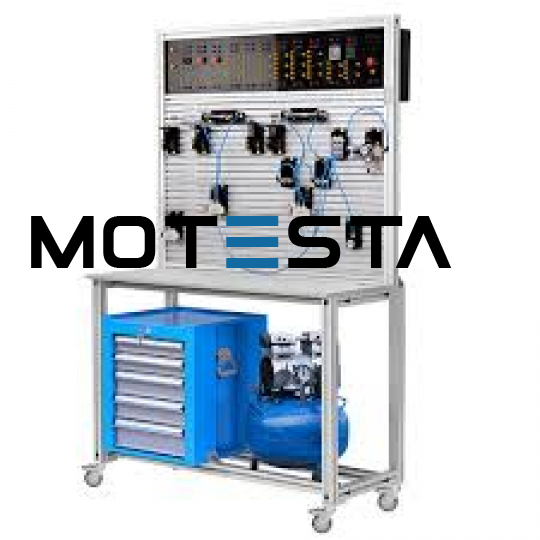 lab@motestainstruments.com | Civil and Mechanical Engineering Lab Equipments India China
lab@motestainstruments.com | Civil and Mechanical Engineering Lab Equipments India China

Code: TVET-ITI-100179
Basic Pneumatic Training Systems.
Basic Pneumatic Training Systems.
Our basic pneumatic system is composed of experimental table, experimental bracket, pneumatic components, and electrical control devices, and so on.
Pneumatic Components
Air compressor, air filter, pressure reducing valve, lubricator, manual
reversing valve, solenoid directional valve, gas control valve, check
valve, throttle valve, quick exhaust valve, OR gate shuttle valve,
single-acting cylinder, double-acting cylinder
| DC power supply | Input: AC 220V Output: DC 24V/3A |
| Air compressor | Power supply: AC 220V±10%, 50Hz Motor power: 600w |
| Nominal volume | 9L |
| Rated output pressure | 1MPa |
| noise level | 66db |
| Groove spacing | 25mm |
| Number of station | 1 |
| Number of caster | 4 |
Experimental Project Type (Different hydraulic circuit and control system can be combined)
1. Basic pneumatic control loop experiment
2. Single loop acting cylinder automatic control
3. Multi-loop acting cylinder automatic control
4. Other comprehensive, extended pneumatic circuit experiments
Examples of Basic Pneumatic Control Loop Experiment
1. Single-acting cylinder commutation circuit
2. Double-acting cylinder commutation circuit
3. Single-acting cylinder speed control loop
4. Double-acting cylinder one-way speed control loop
5. Double-acting cylinder two-way speed control loop
6. Speeds change loop
7. Buffer circuit
8. Secondary pressure control loop
9. High and low voltage conversion circuit
10. Counting loop
11. Delay loop
12. Overload protection circuit
13. Interlock circuit
14. Single-cylinder reciprocating control loop
15. Single-cylinder continuous reciprocating loop
16. Multi-cylinder sequential action loop
17. Double cylinder synchronous action loop
18. Four-cylinder linkage loop
19. Unloading circuit
20. Application circuit of OR gate shuttle valve
21. Application circuit of AND gate double-pressure valve
22. Application circuit of quick exhaust valve
Pneumatic Control Simulation Experiment
We provide the demonstration and control of 10 typical pneumatic
circuits. The action of the experimental loop can be controlled on a
computer.